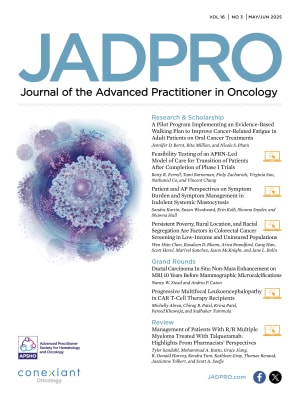Abstract
The immune checkpoint inhibitors ipilimumab, nivolumab, and pembrolizumab represent a substantial improvement in treating advanced melanoma but are associated with adverse events (AEs) likely related to general immunologic enhancement. To ensure that patients receive optimal benefit from these agents, prompt assessment and treatment of AEs are essential. We review the efficacy and safety profiles of these immune checkpoint inhibitors and describe guidelines for managing immune-related AEs. We also present case studies describing the management of toxicities in patients receiving immune checkpoint inhibitor therapy. These cases illustrate the importance of collecting a detailed medical history when administering immunotherapy, as this information is necessary to establish baseline, inform monitoring, and determine the etiology of symptoms. Advanced practice nurses and physician assistants are uniquely positioned to educate patients on the early recognition of AEs and have an important role in establishing appropriate monitoring and open dialogue among services.





